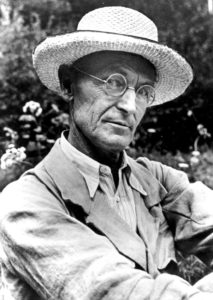Hermann Hesse on Discovering the Soul Beneath the Self and the Key to Finding Peace
INSPIRATIONAL, 4 Mar 2024
Maria Popova | The Marginalian – TRANSCEND Media Service
 “To be nobody-but-yourself — in a world which is doing its best, night and day, to make you everybody else — means to fight the hardest battle which any human being can fight,” E.E. Cummings told students from the hard-earned platform of his middle age, not long after Virginia Woolf contemplated the courage to be yourself.
“To be nobody-but-yourself — in a world which is doing its best, night and day, to make you everybody else — means to fight the hardest battle which any human being can fight,” E.E. Cummings told students from the hard-earned platform of his middle age, not long after Virginia Woolf contemplated the courage to be yourself.
It is true, of course, that the self is a place of illusion — but it is also the only place where our physical reality and social reality cohere to pull the universe into focus, into meaning. It is the crucible of our qualia. It is the tightrope between the mind and the world, woven of consciousness.
On the nature of the self, then, depends our experience of the world.
The challenge arises from the fact that, upon inspection, there is no single and static self but a multitude of selves constellating at any given moment into a transient totality, only to reconfigure again in the next situation, the next set of expectations, the next undulation of biochemistry. This troubles us, for without the sense of a solid self, it is impossible to maintain a self-image. There is but a single salve for this disorientation — to uncover, often at a staggering cost to the ego, the constant beneath this flickering constellation, a constant some may call soul.
Hermann Hesse (July 2, 1877–August 9, 1962) takes up the question of discovering the soul beneath the self in his 1927 novel Steppenwolf (public library).
He writes:
Even the most spiritual and highly cultivated of men* habitually sees the world and himself through the lenses of delusive formulas and artless simplifications — and most of all himself. For it appears to be an inborn and imperative need of all men to regard the self as a unit. However often and however grievously this illusion is shattered, it always mends again… And if ever the suspicion of their manifold being dawns upon men of unusual powers and of unusually delicate perceptions, so that, as all genius must, they break through the illusion of the unity of the personality and perceive that the self is made up of a bundle of selves, they have only to say so and at once the majority puts them under lock and key.
Accepting the fact of the bundle is not easy, for it requires seeking the deeper unifying principle, the mysterious superstring binding the bundle. (After all, daily you confront the question of what makes you and your childhood self the same person despite a lifetime of physiological and psychological change — a question habitually answered with precisely this illusion of personality.)
With compassion for this universal human vulnerability to delusion, Hesse observes:
Every ego, so far from being a unity is in the highest degree a manifold world, a constellated heaven, a chaos of forms, of states and stages, of inheritances and potentialities. It appears to be a necessity as imperative as eating and breathing for everyone to be forced to regard this chaos as a unity and to speak of his ego as though it were a one-fold and clearly detached and fixed phenomenon. Even the best of us shares the delusion.

Considering this ego-self a kind of “optical illusion,” Hesse insists that, with enough courage to break the illusion and enough curiosity about these “separate beings” within, one can discern across them the “various facets and aspects of a higher unity” and begin to see this unity clearly. He writes:
[These selves] form a unity and a supreme individuality; and it is in this higher unity alone, not in the several characters, that something of the true nature of the soul is revealed.
A generation before Hesse, Whitman, after boldly declaring that he contains multitudes, recognized across them “a consciousness, a thought that rises, independent, lifted out from all else, calm, like the stars, shining eternal.”
We call this consciousness, this higher unity of personhood, soul.
Knowing that even the soul is two-fold, Hesse offers his prescription for resisting the easy path of illusion and annealing the soul from the self. Half a century before Bertrand Russell insisted that the key to a fulfilling life is to “make your interests gradually wider and more impersonal, until bit by bit the walls of the ego recede, and your life becomes increasingly merged in the universal life,” Hesse writes:
Embark on the longer and wearier and harder road of life. You will have to multiply many times your two-fold being and complicate your complexities still further. Instead of narrowing your world and simplifying your soul, you will have to absorb more and more of the world and at last take all of it up in your painfully expanded soul, if you are ever to find peace.
It is only by nurturing and expanding the soul that the self, fluid and fractal, can be held with tenderness. And without tenderness for the self, Hesse reminds us a century before the self-help industry commodified the concept, there can be no tenderness for the world and no peace within:
Love of one’s neighbor is not possible without love of oneself… Self-hate is really the same thing as sheer egoism, and in the long run breeds the same cruel isolation and despair.
Couple with Virginia Woolf on how to hear your soul, then revisit Hesse on the courage to be yourself, the wisdom of the inner voice, and how to be more alive.
_______________________________________
 My name is Maria Popova — a reader, a wonderer, and a lover of reality who makes sense of the world and herself through the essential inner dialogue that is the act of writing. The Marginalian (which bore the unbearable name Brain Pickings for its first 15 years) is my one-woman labor of love, exploring what it means to live a decent, inspired, substantive life of purpose and gladness. Founded in 2006 as a weekly email to seven friends, eventually brought online and now included in the Library of Congress permanent web archive, it is a record of my own becoming as a person — intellectually, creatively, spiritually, poetically — drawn from my extended marginalia on the search for meaning across literature, science, art, philosophy, and the various other tendrils of human thought and feeling. A private inquiry irradiated by the ultimate question, the great quickening of wonderment that binds us all: What is all this? (More…)
My name is Maria Popova — a reader, a wonderer, and a lover of reality who makes sense of the world and herself through the essential inner dialogue that is the act of writing. The Marginalian (which bore the unbearable name Brain Pickings for its first 15 years) is my one-woman labor of love, exploring what it means to live a decent, inspired, substantive life of purpose and gladness. Founded in 2006 as a weekly email to seven friends, eventually brought online and now included in the Library of Congress permanent web archive, it is a record of my own becoming as a person — intellectually, creatively, spiritually, poetically — drawn from my extended marginalia on the search for meaning across literature, science, art, philosophy, and the various other tendrils of human thought and feeling. A private inquiry irradiated by the ultimate question, the great quickening of wonderment that binds us all: What is all this? (More…)
Go to Original – themarginalian.org
Tags: Awareness, Consciousness, Inspirational, Life, Spirit soul, Spirituality, Wisdom
DISCLAIMER: The statements, views and opinions expressed in pieces republished here are solely those of the authors and do not necessarily represent those of TMS. In accordance with title 17 U.S.C. section 107, this material is distributed without profit to those who have expressed a prior interest in receiving the included information for research and educational purposes. TMS has no affiliation whatsoever with the originator of this article nor is TMS endorsed or sponsored by the originator. “GO TO ORIGINAL” links are provided as a convenience to our readers and allow for verification of authenticity. However, as originating pages are often updated by their originating host sites, the versions posted may not match the versions our readers view when clicking the “GO TO ORIGINAL” links. This site contains copyrighted material the use of which has not always been specifically authorized by the copyright owner. We are making such material available in our efforts to advance understanding of environmental, political, human rights, economic, democracy, scientific, and social justice issues, etc. We believe this constitutes a ‘fair use’ of any such copyrighted material as provided for in section 107 of the US Copyright Law. In accordance with Title 17 U.S.C. Section 107, the material on this site is distributed without profit to those who have expressed a prior interest in receiving the included information for research and educational purposes. For more information go to: http://www.law.cornell.edu/uscode/17/107.shtml. If you wish to use copyrighted material from this site for purposes of your own that go beyond ‘fair use’, you must obtain permission from the copyright owner.
